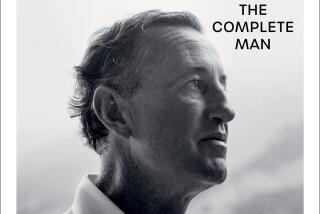Kurt Singer, 94; Espionage Writer and Biographer Spied on Nazis in World War II
- Share via
Kurt Singer, an anti-Nazi activist and spy during World War II whose dozens of books include works on espionage and biographies on subjects as diverse as Hitler henchman Hermann Goering and actor Danny Kaye, has died. He was 94.
Singer died Friday in Santa Barbara of natural causes, said his son, Kenneth.
The prolific and eclectic writer was born in Vienna and grew up in Berlin, where he became increasingly worried about the rise of Adolf Hitler and the Nazi regime.
With his first wife, Hilde Tradelius, he began publishing an anti-Nazi underground weekly in 1933.
The Nazis soon put a price on his head, and he fled to Stockholm.
Working as a journalist for Swedish and Swiss publications, Singer helped found a pro-Allies newspaper and a committee to free anti-Nazi leader Carl von Ossietzky from a concentration camp.
With Kurt R. Grossman, he wrote a biography of Von Ossietzky that he believed helped win the Nobel Peace Prize for the humanitarian.
In Sweden and later in the U.S., the writer functioned as a spy, providing information for the Allies about Russian and Nazi activities in Scandinavia.
“I was deeply involved in espionage as my contribution to fight and destroy the Hitler regime,” Singer said in a recent autobiography for the Danish Peace Academy. “I worked with the Swedish secret service, the British, the American and mostly with the Norwegian secret service of their government in exile.”
When Singer published the biography “Goering: Germany’s Most Dangerous Man” in 1940, Germany demanded that Sweden confiscate all copies and hand over Singer.
Although Sweden originally denied the extradition, it did ban the book, and Singer made plans to leave for the United States.
In 1943, he published “Duel for the Northland: The War of Enemy Agents in Scandinavia.”
That book sparked a long line of works about espionage -- among them “Spies and Traitors of World War II,” “Three Thousand Years of Espionage,” “The World’s 30 Greatest Women Spies,” “The World’s Best Spy Stories” and “Spy Omnibus.” He edited many other books on espionage and a biography of the legendary Mata Hari.
Singer’s major books on crime were “My Greatest Crime Story, by Police Chiefs of the World” and “My Strangest Case, by Police Chiefs of the World.”
In the 1950s, he returned to biography, chronicling a mix of subjects including Kaye, Charles Laughton, Ernest Hemingway, Albert Schweitzer and President Lyndon B. Johnson.
With his second wife, Jane Sherrod, to whom he was married from 1955 until her death in 1985, Singer wrote juvenile books such as “Spies for Democracy,” “Great Adventures of the Sea,” “Great Adventures in Crime” and “Ghost Book.”
As an editor, he frequently delved into the supernatural, working on such books as “I Can’t Sleep at Night: 13 Weird Tales,” “Plague of the Unknown” and “Ghouls and Ghosts.”
In 1955 he founded Singer Communications Inc., a syndicated international news service based in Anaheim, and served as its president.
A lecturer on World War II and the history of espionage, he donated his collection of historical works to the Special Collections Archives at Boston University.
Born Kurt Deutsch, Singer took his mother’s maiden name. He studied at the University of Zurich and at Labor College in Stockholm. In 1951, the year he became a U.S. citizen, he received a doctorate from the Divinity College of Metaphysics in Indianapolis.
In addition to his son, the once-divorced and once-widowed Singer is survived by his wife of 18 years, Katherine, and two grandchildren. His daughter, Marian, died in 2004.
A memorial service is planned in Santa Barbara in January. Contributions can be made to Berkshire County Arc, 395 South St., Pittsfield, MA 01202.
More to Read
Sign up for our Book Club newsletter
Get the latest news, events and more from the Los Angeles Times Book Club, and help us get L.A. reading and talking.
You may occasionally receive promotional content from the Los Angeles Times.








